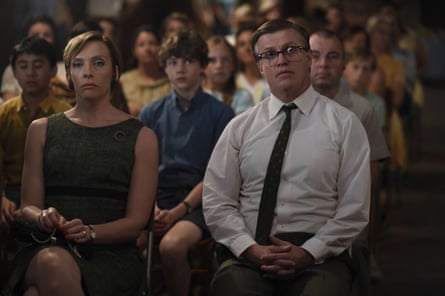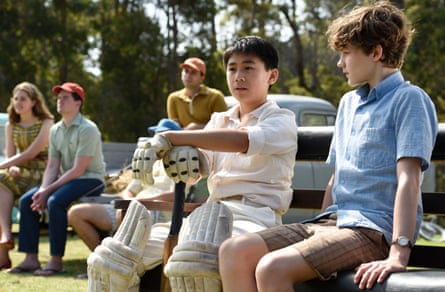Craig Silvey’s bestselling 2009 novel Jasper Jones was greeted with none-too-faint praise, lauded in some circles as Australia’s own To Kill a Mockingbird. The arrival of a feature film from the director Rachel Perkins – on the heels of several successful stage adaptations – raises the question: can the same be said of the movie adaptation? Is this our Mockingbird?
I prefer to think of it as Stand By Me down under, with a bit of Boo Radley and Tom Robinson thrown in.
Perkins’ morbidly enchanting coming-of-age drama has much in common with the director Rob Reiner’s beloved 1986 adaptation of a Stephen King novella. From the small-town period setting, to the presence of secret-bound kids discovering a dead body, to the way these wide-eyed pipsqueaks huddle together and exchange scepticism about the adult world, including coming to terms with abusive parents. Both films feature protagonists who are writers.
During one scene in Stand By Me, two boys discuss whether Mighty Mouse could beat up Superman. As Jasper Jones opens, 13-year-old Charlie (Levi Miller) and best buddy Jeffrey (Kevin Long) debate whether Batman is technically a superhero given that he has no actual superpower – and whether Spider-Man would be of any use in their (fictional) home town of Corrigan, given that there is so little to swing from.
Soon after, Perkins abruptly changes tone. Late at night, Charlie is roused by a boy tapping at his window. He is Jasper Jones (Aaron McGrath), a teenage outcast of mixed white-Aboriginal heritage. Jasper, distressed, convinces Charlie to sneak out so he can show him something.
The titular character is a little older and a lot tougher; the kind of guy Charlie wants to impress. On the way to the woods Jasper offers him a cigarette. In the film, Charlie (who’s never smoked in his life) knocks him back: “It’s not my brand,” he says, maintaining faux coolness.
Silvey described that moment differently in the book, which is written from Charlie’s first-person perspective. “I decide to press my palms to my stomach and puff my cheeks when I wag my head at his offer,” the author wrote, “as if to suggest that I’ve smoked so many this evening that I’m simply too full to take another.”
That moment, or that kind of behaviour, works fine on the page, but adding dialogue translates a lot better for the screen. The change is small but telling: an early sign that this adaptation (penned by Silvey and Shaun Grant, who also wrote Snowtown) has been handled with great care and diligence.
Jasper escorts Charlie to a secluded part of the woods he calls his own, where the corpse of a teenage girl is dangling from a tree. Jasper is convinced he’s been framed for murder and Charlie believes him. They hide the body and resolve to find the culprit.

This kickstarts a detective story component à la bicycle rides, trips to the library and jumps over neighbours’ fences; I kept waiting for Charlie to pick up a magnifying glass. The film has a twang of old-school, would-have-gotten-away-with-it-if-it-wasn’t-for-you-meddling-kids sleuthing about it, like a plot out of The Hardy Boys.
Charlie also navigates the challenges of pubescent life, including managing interactions with a girl he fancies (Angourie Rice) and dealing with his parents. Dan Wyllie plays Charlie’s mild-mannered father and Toni Collette – terrific as always, with broad range of emotions to play with – his hard-nosed mother, for whom small-town life is constraining and dull.
Another titanic Australian actor emerges quite a ways into the running time: a grubby, singlet-clad, bushy-bearded Hugo Weaving. Looking as though his facial hair deserves its own postcode, Weaving plays Mad Jack Lionel, a Boo Radley-type recluse who could either be genuinely dangerous or a sort of blank canvas on to whom the townspeople project their fears and insecurities. Levi Miller, hot on the heels of playing the lead (human) role in Red Dog: True Blue, is just 14 years old but already a rock-solid casting choice.
The race relations component of Silvey’s book, which is ultimately where the To Kill a Mockingbird comparisons came from, is a little more pronounced in the film.

When Jeffrey – an avid cricket fan of Vietnamese descent – takes to the oval in the novel, it’s clear that the crowd in the bleachers don’t embrace him, primarily because he’s an unproven last-ditch substitute player. On screen, their response feels like barely contained racism. When Jeffrey starts performing well on the pitch, onlookers are impressed by the youngster’s skills and increasing get behind him. Perkins doesn’t have to labour the point that this is utterly, strangely Australian: barely latent bigotry is everywhere but hey, this fella can hit a ball pretty good, so perhaps he’s OK so long as he keeps batting for our team.
The cinematography of Mark Wareham (who shot Redfern Now: Promise Me and Cleverman) leans towards a reasonably adult palette. In daytime scenes Jasper Jones looks crisp, autumnal and vaguely sepia-like – as if the narrative is playing out in an older person’s memory. At night the colours look a little drained and the frame a little rigid; there are times when I wanted to push the camera off its tripod and add a beam of light or two.
Rachel Perkins, whose directorial work includes Bran Nue Dae and One Night the Moon, threads the plot’s various elements together so seamlessly it’s easy to forget that Jasper Jones ticks many boxes at the same time: a charming, genre-traversing film. It’s compelling as a whodunnit, touching as a coming-of-age story, insightful as a picture of race relations and crafty as a drama about secrets, concealing a few of its own for a final, satisfying reveal.

Comments (…)
Sign in or create your Guardian account to join the discussion